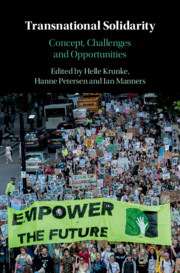Book contents
- Transnational Solidarity
- Transnational Solidarity
- Copyright page
- Contents
- Figures
- Tables
- Preface
- Introduction
- Part I Transnational Solidarity
- 1 Solidarity
- 2 Solidarity Between the National and the Transnational
- 3 Democratic Solidarity Between Global Crisis and Cosmopolitan Hope
- 4 Chains of Solidarity
- 5 Symbols and Myths of European Union Transnational Solidarity
- Part II Transnational Solidarity in Europe
- Part III (Re)Establishing Transnational Solidarity Within Existing European Institutions and Political Settings
- Part IV Creating New Forms of Transnational Solidarity in Europe
- Index
2 - Solidarity Between the National and the Transnational
What Do We Owe to ‘Outsiders’?
from Part I - Transnational Solidarity
Published online by Cambridge University Press: 04 July 2020
- Transnational Solidarity
- Transnational Solidarity
- Copyright page
- Contents
- Figures
- Tables
- Preface
- Introduction
- Part I Transnational Solidarity
- 1 Solidarity
- 2 Solidarity Between the National and the Transnational
- 3 Democratic Solidarity Between Global Crisis and Cosmopolitan Hope
- 4 Chains of Solidarity
- 5 Symbols and Myths of European Union Transnational Solidarity
- Part II Transnational Solidarity in Europe
- Part III (Re)Establishing Transnational Solidarity Within Existing European Institutions and Political Settings
- Part IV Creating New Forms of Transnational Solidarity in Europe
- Index
Summary
Recently, people on both sides of the Atlantic have been wrestling with questions concerning the priority they should give residents of their own country versus distant others. In Europe, the issue of the acceptance and treatment of migrants from the Middle East and North Africa came to prominence. Likewise, in the USA, President Trump attempted to bar Muslims from entering the county, increased the deportation of undocumented migrants fleeing violence and hardship in Latin America and drastically cut the number of admissible refugees. The issue of priority to ‘countrymen’ has also arisen in debates about international trade, as well as in regard to foreign aid and the obligation to maintain regional and global alliances. These practical contexts raise questions of what we owe ‘outsiders’, whether they be distantly situated or attempting to migrate to our own or to a different state, and the conflicting solidarities. Should we always stand in solidarity with fellow citizens or other members of our own political communities, or should we equally prioritize solidarity with oppressed or suffering others outside our borders? In this chapter, I attempt to clarify these issues by analysing two main senses of solidarity and discussing the question of negotiating between them when they conflict.
- Type
- Chapter
- Information
- Transnational SolidarityConcept, Challenges and Opportunities, pp. 22 - 41Publisher: Cambridge University PressPrint publication year: 2020
- 2
- Cited by

